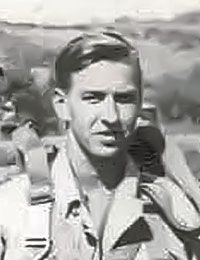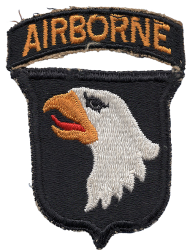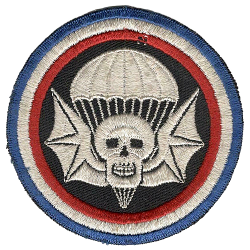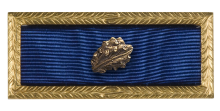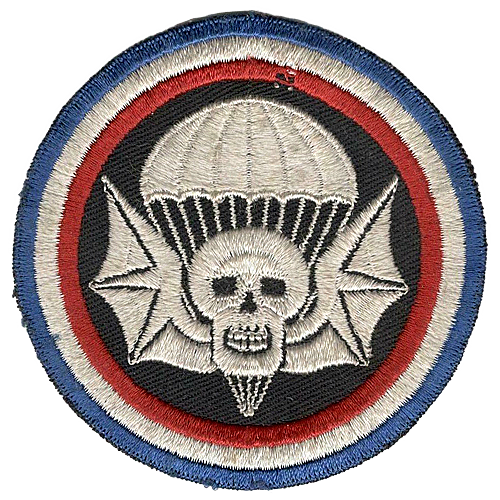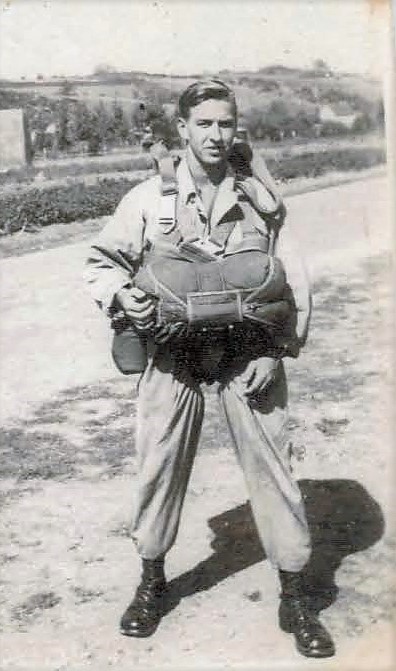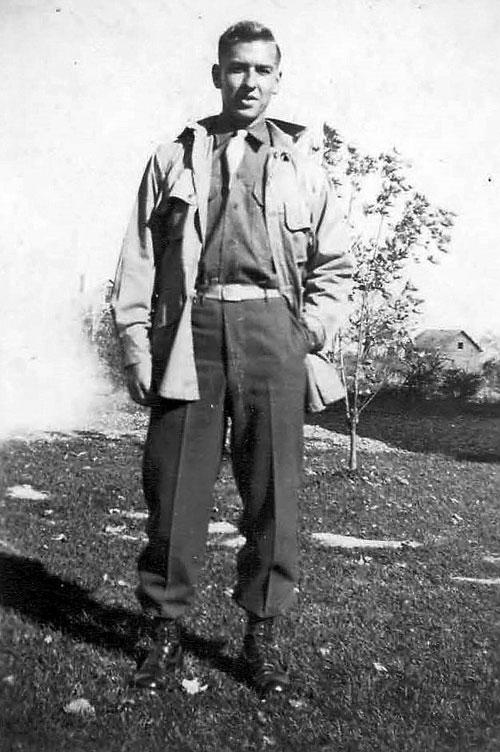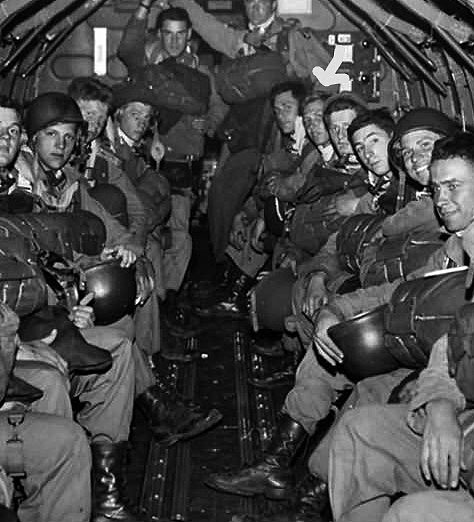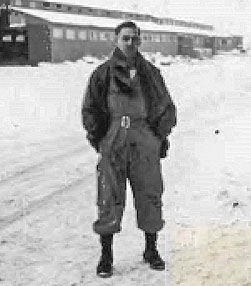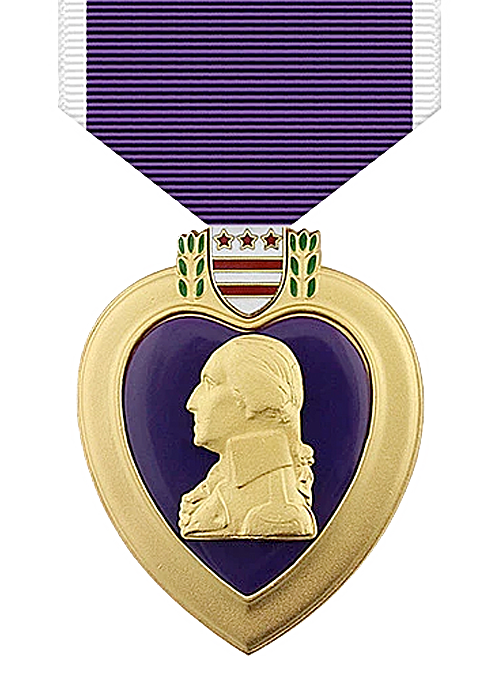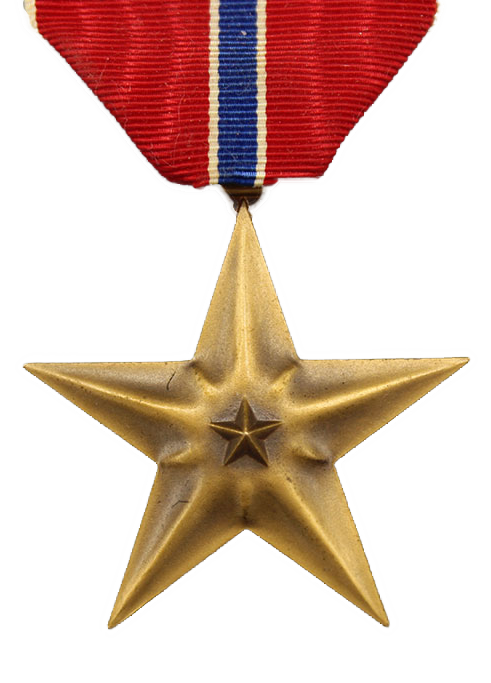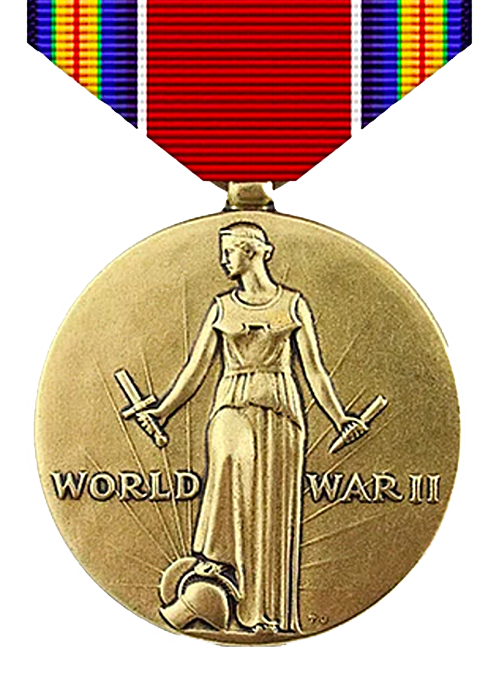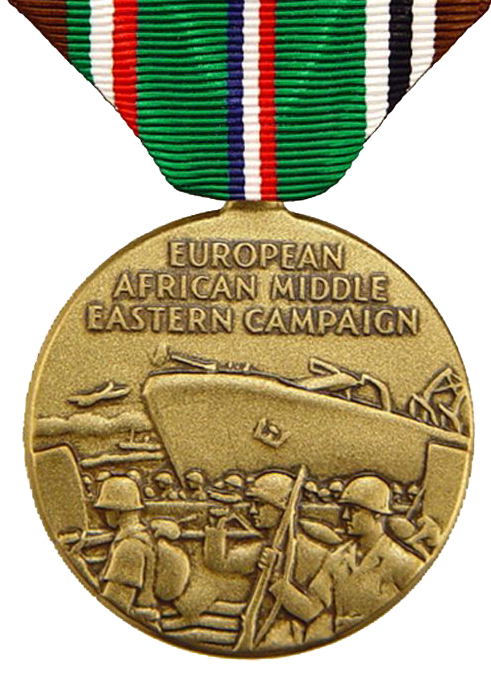I was drafted in February 1943 and inducted into the army in February of 1943 and went to Ft. Leavenworth, Kansas for physical and aptitude tests. From there, I boarded a train with all the shades pulled down for security reasons. Everything was kept very secret; no information was disclosed. This was to prevent troop movements and plans from falling into enemy hands. Along the way, we all tried to guess whether we were headed for the Pacific or Europe.
The train pulled into Camp Campbell, Kentucky at night in a driving rainstorm. The base at that time was an armored force base. I stayed there for several months then transferred to the airborne despite the attempt to discourage the move by armored force officers (too many transfers reflected poorly on them). I traveled to Fort Benning Georgia for parachute training and jump school. The first day at jump school all of the new candidates were marched to a field and seated around the perimeter to witness a mass parachute drop. Most of us had never seen a actual parachute jump. As the planes came over, a jumper out of the first plane had a chute that didn't open and was killed right before us. We were quickly run down to the Chattahoochee river and ordered not to speak about the accident. We were also told that we could pick up "quit slips" if we wanted out. Quite a few guys did bail out over the next couple of days, but I really wanted to be a paratrooper, so I stayed. Those of us who stayed, continued in jump school and qualified after five jumps. There were no specialists who packed the parachutes; we had to pack our own chutes after training all day. Uncertainty about our skill in packing the chutes only added to our lack of confidence about exiting an airplane mid-air.
From Ft. Benning, I went to Camp Mackall, North Carolina, and then to Ft. Meade, Maryland, where we were held for week. We were then sent to Hampton Roads and shipped across the Atlantic to Europe. We sailed on a small ship with an all British crew. We headed to Newfoundland and then across the wild north Atlantic to Bangor, Ireland. Most of us were seasick for the entire 13 days of crossing and had no desire for food. Those who could eat claimed the meat was horse meat. The only thing I ate was fruit cocktail, but it got me through till we landed.
January, 1944
From Ireland, we were shipped to Chilton-Foliat, England which became our home while we trained for the D-Day invasion. Our training consisted of night jumps and maneuvers, especially off the southern coast which was similar to the Normandy coast. During one training exercise in the area of Slapton Sands, catastrophe struck. Close to 700 soldiers drowned while practicing landings their landing crafts were sunk by German torpedo boats.
We were now being given the plans to the D-Day invasion and what our role was to be. We were restricted to our camp and not allowed out to have any interaction with the townspeople for fear of leaking plans for the invasion. In the period before D-Day, my father died in Indiana, but I was not allowed to come back because it could have been a security problem for the impending invasion. In fact, I received no official notification about his death or funeral. I learned about it in a letter from a neighbor girl who wrote that she was very sorry about my father and I asked the Red Cross to find out what had happened. Soon we were sent to a marshaling yard with barbed wire and fences around the giant pen. All we could do was eat and get our gear ready. We were fed very well as some said "Fattening us up for the slaughter."
June, 1944
The evening of June 5th we knew it was the real thing when we put on our equipment and General Eisenhower walked through the ranks and talked to the troops. As light began to fade we walked to our places and put on the more than 100 pounds of equipment. This was in addition to the main parachute and reserve chute. This was by far the heaviest load we ever jumped with. We were so loaded down we had to have two assistants help us up the steps into the plane. It was around 11:00 when we took off and in the dark there was very little talking. Approaching the coast of France our plane began bucking and lurching as anti-aircraft fire started mixed with machine gun tracer fire. The pilots were supposed to stay in formation and drop us in planned drop zones but many broke formation and dropped troopers all over the peninsula. Some landed in the flooded marshes and others in the English Channel. Our pilot dropped us relatively close to our drop zone, but much too low to the ground and at a speed that tore much of the equipment off our bodies when the parachute's opening shock hit. I was only in the air for a few seconds, but was surprised by the sounds and motion of the tracer fire. The tracer bullets seemed to be curving as they came up and then made a cracking noise as they went by. The landing was very hard, but I was unhurt. The first person I encountered was a man in my squad who said he'd been hit and couldn't get out of his chute. I cut him out and after checking him over we decided he'd landed so hard with all the equipment on top of him that he thought he'd been hit. There was machine gun fire over our heads, so we headed the opposite direction and by sheer luck walked on to a lane where we soon bumped into 4 or 5 other members of our company. We then headed for the beach where we were to secure the causeway. This causeway was to be secured for use by our seaborne troops coming in from the beach. As we started down the lane with four of us on each side, we came to a sharp bend in the road and a figure suddenly appeared riding a bicycle. He rode down the road between us and after he had passed it dawned on us that he was a German and we should have stopped him.
Shortly after, just as it began to get light, we had our first casualty. A sniper in a farmhouse killed one of our men as he approached the house. We moved on and were sobered by the sight of many collapsed parachutes with boots protruding out. After walking several miles we came to the causeway which lead to the beach. I was still with the man I landed with, so he took a position on one side of the road and I took the other. As we looked toward the beach, we could see hundreds of figures coming down the causeway. A small group of 7 or 8 approached us ahead of the others and we realized they were Germans. They didn't see us until we stood up and demanded they surrender. They did. We noticed one was injured and bleeding from a head wound. Some of them motioned for us to shoot them. Apparently they had been told they would be tortured and mistreated by the Americans. We escorted them back to a farmhouse where some of our troops would interrogate them. We then went back to our positions on the causeway waiting for the main body of troops which were GI's of the 4th Division. The rest of the first day was spent rounding up German stragglers coming inland from the beach. Later we set up outposts for security the first night.
The next couple of days we were exposed to the terrible consequences of the artillery and bombing of both the Germans and the Allies. All the carnage, plus the stench of bloated carcasses of cattle and humans was demoralizing and depressing. After the successful seaborne landings and securing the beach area, our next objective was to capture the city of Carentan, France which was a junction of critical roads. These were vital to a breakout of the Allied troops from the Cotentin Peninsula to the rest of France. The battle of Carentan was the hottest action our Division had been in up to that time and for our battalion perhaps the hardest of the war. Our orders were to move down the causeway over several small bridges into the city. The causeway was a raised roadway with marshland on either side. In the marshes were small raised areas that concealed German machine gun nests zeroed in on the causeway. At the Carentan end of the road were German 88 guns which controlled movement on the causeway and prohibited any vehicle movement. The 88 German gun was considered the best artillery piece of any army in WWII, used effectively as anti-aircraft, anti-tank, and plain field artillery.
Our orders were to move down this road and into the town. We were deployed on the side of the causeway with half of the battalion waiting on the banks of a small stream for darkness to move up onto the road. While in this position, two German dive bombers came down and bombed us, one strafing the riverbank where I was and the other attacking the troops lying on the road. Our position along the river bank was not hit as hard as those who were on the causeway.
As soon as darkness came, I was sent out on a litter bearing detail. There were two of us per litter and we picked up the wounded along the sides of the causeway. Most had been hit in the back and buttocks and were semi-conscious as we packed them back to the aid station. Some we carried as far as a quarter mile. It didn't take long to realize how heavy a 150 pound body can be. Most of the paratroopers at that time were stocky built and in the 145 to 150 pound range. We continued to carry wounded until light began in the morning and I found myself being fired on from somewhere out in the marshland. With no cover, the only place that provided any concealment was the area at the bottom of the road embankment next to the marsh weeds growing there. I was fired on continually all morning and there is no explanation for why I wasn't hit. I never saw where the gunfire came from. Finally after several hours of continuous firing, I decided to get up and make a dash up onto the causeway and across a plank bridge. I had been alone all day, having lost my litter bearing partner and could not locate any of the company. Given how bad the situation was I was in, I figured the other side had to be better.
When I crawled out of the marsh and onto the causeway, I saw literally thousands of bullets all around where I had lain, but they were red, yellow and blue wooden bullets not metal. (I never saw them again in any of the other battles.) I made a crouching dash across the bridge and found the Germans didn't hesitate in firing an 88 artillery shell at one single individual running across a bridge. I could feel the air turbulence of the shell as it passed under my arm. My only option was to try and find cover on the other side of the roadway. I slid down to the marsh on the other side and found no more cover than where I'd been, but much less enemy fire. Moving and crouching as I went toward Carentan, the firing was steady but less than on the other side. About noon all firing stopped and soon I could see a vehicle coming down the road loaded with German and American wounded and a truce flag on the hood. Several of our wounded were limping back to our lines and one I recognized as an instructor I had in jump school. He had been hit in the leg and was painfully trying to reach our aid station. After a few minutes the vehicle went back up the causeway and the firing resumed with as much intensity as it had all morning. It continued until darkness began to close in and our men started to straggle back in pairs or as individuals toward the place we had started that morning. No one knew what the outcome of the battle was or if we were in control of the town or not. I encountered another trooper moving back and exhausted the two of us struggled back to the end of the causeway where we found a rabbit house. We crawled into it, covered ourselves with straw and instantly went to sleep until morning.
Waking up at daylight, we very cautiously pulled off the straw and looked through the cracks and saw nothing. No Germans, no Americans. With a little more confidence, we stepped out and saw our troops in an orchard about 100 yards away. We quickly ran toward them and received the great news that the Germans had withdrawn during the night. This battle was notable not only for the capture of Carentan, but also because our battalion commander Colonel Cole was awarded the Congressional medal of honor for leading a bayonet charge that dislodged the Germans from a farmhouse and adjacent positions. The charge was primarily for morale and intimidation purposes; and seemed to accomplish it's objective. Later that day, we passed through Carentan and saw our casualties in the streets and ditches and even more of the German dead. It was then we found that the German unit opposing us was the 6th parachute regiment, known as an elite outfit.
Following this battle, we mopped up pockets of retreating Germans. Then with orders to prepare for another mission, we returned by ship to England and our home away from home at Chilton-Foliat. It was a very welcome homecoming and sanctuary until our next mission, a Holland jump ordered for mid-September. One Sunday afternoon while at Chilton-Foliat, a Sargent yelled into our barracks and asked "Who wants to enter a spot jump and win a barrel of beer for the company?" I volunteered without any idea of how to maneuver my chute onto the haystack target. They took ten of us up and made circles over the target and each time a jumper would exit. I went to the end of the line and watched where the plane was in relation to the target and where the jumpers landed. I made my exit over the point where the man closest to the target had jumped and guided my chute onto the haystack. No one was more surprised than I was to have won the contest. While it wasn't such a great feat, it sure made me more popular in the Company for awhile.
September, 1944
The Holland jump was to be a daylight jump and adjusting for the mistakes made during the D-Day drop it was well planned. The plane trip to Holland went smoothly with no opposition from anti-aircraft fire until we neared our drop zone at Zon, Holland. All the planes held their formation this time, unlike the fiasco of D-Day. Everything went well until I went out the door and was hit on the chin and knocked unconscious I came around just before landing and then went black again. I was hit either by a piece of spent flack or piece of loose equipment. When I came around, one of the men from my plane was patching up my chin.
We had to get off the drop zone quickly and move toward our objective to secure the highway for British armor. The British were to move rapidly up the highway to the Rhine River and on into Germany. The plan sounded good, but often the Germans were able to establish road blocks and stop the British tanks. Our battalion had the job of driving the Germans from a bridge at Best. It turned out to be a bigger job than anticipated and snipers began to take a toll on our men. A heavy artillery barrage kept us in our foxholes and word of German tanks coming made the situation even more dicey. Our regimental commander, Colonel Cole, called for air support and went out in a field to lay out colored panels to tell the pilots where our lines were and where the Germans were. While doing this he was shot by a sniper and killed. An officer called for a bazooka to shoot into a house across the road from our two man foxhole. As we had a bazooka, we climbed out of our hole and set up to fire at the house. I took the tube and my foxhole partner hooked up the battery at the rear of the tube. An officer was standing behind excitedly yelling for us to hurry up and fire. My partner had the presence of mind to tell the officer to move away from the back of the bazooka because that's where the blast exits. I hadn't fired a bazooka since basic training and my first shot went completely over the roof but the second shot was dead on and went through the roof. In a few minutes, four Germans came out of the house with their hands up. We were surprised when a couple of them motioned for us to shoot them. (We had this happen several times when we captured Germans.) We were told that one of them was the sniper who killed our Colonel.
Our situation continued to be precarious as German tanks and infantry were moving in on our positions. Air support finally arrived and strafed the house and lines of the Germans but they still came on. As evening began and just in time, British tanks finally rolled up and paratroopers followed to drive the Germans out. They began to surrender by the hundreds. As they came out, they were lined up on the road and sent to the back of our lines guarded only by one guard for hundreds of prisoners.
After this action, we held the highway for awhile and finally moved up to the Rhine river close to the German border. British paratroopers had landed on the other side of the Rhine at Arnhem Germany but poor planning had left them without heavy weapons and surrounded. The entire force was wiped out except for those that surrendered. This failure was the end of the attempt to drive into Germany through Holland. It was generally thought that the lack of aggression by British takers and their officers doomed the British paratroopers surrounded at Arnhem. American paratroopers had rowed across the river in makeshift boats and captured the far end of the bridge. The British failed to hurry and take advantage of the capture with their tanks. This meant the American paratroopers had to withdraw because they had no heavy weapons with which to battle the German tanks.After spending weeks on the border we were ordered to move out to a new base at Mourmelon, France. It was a great relief to be living in barracks again after being on the line for 3 months. We also had furloughs to Paris to enjoy. We still had duties and training but with furloughs and passes to look forward to our morale was up.
December, 1944
One night as I was sitting on my bunk shining boots and getting a dress uniform ready for a pass to Paris, my activity was interrupted by a man coming through the barracks yelling "Get your gear packed, we're moving out in the morning." Everyone thought it was just another rumor, but soon the order was verified and we spent the night throwing our gear together. By noon the next day we were piling into trucks heading for destination unknown. The day was gloomy and we headed north. After a while we began to meet American troops straggling to the rear and many yelled to us as we passed "You'll be sorry." We still didn't know where we were going or what the retreating troops were talking about. The withdrawing troops continued to pass us going the opposite way until darkness came. We finally stopped close to a city which we later learned was Bastogne, Belgium.
The next day the weather changed to heavy snow and we realized we were terribly ill equipped for the conditions. However, it was beautiful to walk through the snow covered evergreen trees with all sounds muffled and everything visible blanketed with the deep soft snow. We hadn't encountered any enemy yet, but we were sure that wouldn't last long. We were right the next day our orders were to move forward until we encountered the enemy. We moved down a snow covered road and after going several miles suddenly everything exploded with 88 shells, mortars and machine gun fire shredding the trees around us. We hit the ground and started digging but entrenching tools didn't cut well into the frozen ground. Once again we had a number of casualties, this time many were from tree bursts which shot shrapnel down from the tree tops. The tree branches themselves became dangerous as they struck men on their descent. Our communications Sargent was hit in the back by a large tree limb and was evacuated back to an aid station. He didn't return to our outfit until almost the end of the war. Another man was shell shocked and got out of his foxhole and wandered around fully exposed to the fire. Miraculously, he wasn't hit and was finally dragged back into his hole. Days later when questioned about his wandering, he said he was sure he was going to be hit. Unfortunately, his premonition came true. Several days later he was again in a foxhole and a large shell hit on the lip of the foxhole; and although it didn't explode, it caused a frozen slab of earth to crush him. The vagaries of combat.
A fellow trooper and I were in the middle of a snow covered field one morning when suddenly a mortar shell exploded close by us. We both hit the ground and burrowed into the snow. The first shell was followed by almost a dozen more each coming closer. I just knew we were going to be hit, but then it stopped and we got up and ran for the woods. Later that day looking back at the spot, we could see how close the hits had been to where we were. How or why we escaped unhurt was a mystery. A few days later we settled into a defense position. We dug our foxholes in back of a small block shed which had housed some animals. It was just tall enough to stand upright in and measured about six by nine feet. We called it our "hog house". Eight of us used it as sleeping quarters, but usually there would only be about four in it at a time. We slept with all our clothes on including boots. Our clothes were so greasy and dirty from sleeping, eating, and fighting in them that they were almost waterproof. We heated our "hog house" with a gallon of sand soaked in gasoline which provided a long lasting flame. The order came down to move out of this area and we advanced up the hill about a mile into an area where the Germans were dug in. As we moved up, the enemy moved back and we found ourselves occupying their sector. Our bedrolls had not been moved with us, so we were at the mercy of the weather at night. The cold took its toll of frostbite and frozen extremities. Everyone was ordered to take off their boots and socks daily and massage their feet to prevent frostbite.
As night came one day, I passed a G.I. sitting on a large stone gate post. When I passed I yelled "Are you OK Mac?" He nodded yes. Coming by the same spot the next morning I found him still sitting there frozen. One bitterly cold night another trooper and I were not able to find shelter for the night as all the bunkers were filled with shivering G.I.'s. Our muscles began to cramp and we know we had to do something to keep from freezing to death. Our solution was to walk all night. The next morning about fifty yards from where we'd spent walking the whole night, I stumbled across a beautiful log covered bunker and in it were six G.I.s and a couple of Germans. It was warmed by gasoline soaked sand. The Germans had surrendered and had spent a comfortable night while my buddy and I nearly froze to death.
This was typical of the confused events that winter in Bastogne. The front lines were tangled and you never knew where we held the ground and where they did. Our battalion commander and his radio operator were killed by a bomb dropped by an American plane. On Christmas Day a large force of German tanks broke through our lines and was heading for our headquarters. We headed for our hole but we knew we didn't have any weapons large enough to stop them. We could hear the tanks "clinking" as they came closer. Then out of a patch of woods came a group of tank destroyers we didn't know were there. They cut loose on the tanks and stopped them in their tracks. The Germans sent a group under a white truce flag to our headquarters and asked for our surrender. This was the occasion for General McAuliffe's famous reply of "Nuts" to their demand. McAuliffe later said it was the only thing he could think of to say to show his contempt for the demand.
The stubborn resistance of airborne troops seemed to break the drive of the Germans every place they probed. By denying them access to road junctions their tanks couldn't advance and their plans stalled. We seemed to be able to do just enough to throw the German timetable off or otherwise "gum up the works" which thwarted their drive to the coast. Our regiment was surrounded in every campaign we had experienced before the Bulge. We were surrounded in Normandy and Holland and now we found ourselves surrounded again in Bastogne. We were actually acquainted and comfortable with the circumstance and consequently adjusted ourselves well as a fighting unit in the Battle of the Bulge. Most of the time we were surrounded in the bulge we saw no planes because of the clouds and snow. Occasionally, the Germans would bomb Bastogne at night but there was very little air activity by either side until the weather broke. When the sun finally appeared our Thunderbolt fighters bore in and bombed the enemy unmercifully. Often times we were almost as close to the bomb craters as were the enemy. Our planes killed our battalion commander and his radio operator with an errant drop of bombs. Many casualties were due to accidental or friendly fire, but this was expected with the battle lines so close to one another.
The break in the weather coincided with the arrival of General Patton's armored forces. When the heavy tanks and artillery arrived, the bulge was broken open and it was then our turn to go on the offensive. We immediately moved forward with little resistance through the forests. The danger was still there even though the enemy was pulling back toward Germany.
It was while moving forward that I was slightly wounded crossing an intersection that the Germans had zeroed in on with a machine gun. The gun began firing as we got to the middle of the road. Another paratrooper and I dove for a shallow slit trench by the side of the road. He got there first and I landed on top of him but my top arm was exposed and was creased by a bullet. My foxhole buddy went back to an aid station with me where the injury was treated with sulfa and bandaged then back to the road again. Our division was re-directed from driving toward Germany to moving to Bavaria and Austria. This moved us from the cold of the Ardennes forests to the scenic areas of Germany and the mountain terrain. It was beautiful country and we were able to relax. It was in this area that my brother once again located me and we had another visit for several hours. (This was my one year older brother who had previously connected with me in Alsace where both our divisions were in action. He was in an armored division and had access to a jeep.)
May, 1945
While billeting in Kempton, Austria the Germans surrendered and the war in Europe was over. We were still kept on duty as occupation forces in the long valley leading to Italy. After spending some time at Berchtesgarden where Hitlers Eagle's Nest was located we were then dispersed in small groups to the villages in the valley. The duty became easy and it was very much like a vacation. For the first time in two years we were able to have lights on at night and heard radio music from the states. The first song we heard was "Don't Fence Me In". What a welcome sound. Things were fine except we were starving. Our supply line had been extended so far that rations weren't getting to us at the far end of the valley. Potatoes with nothing to fry them in and no butter to spread on them lose their appeal very quickly. We were told that most of our rations were being diverted to German civilians who were in dire straits. The children would gather around our field kitchens and scrape the pots and kettles for food before they were washed. As soon as the war was over, the order came down that there would be no fraternizing with the enemy. That lasted about one day and then was completely ignored. The non-fraternization order applied to all Germans because the government felt the Germans were treated too leniently after WWI. However, the fact that the army was composed of young men and the civilians were many times attractive young girls made it impossible to prevent interaction. Otherwise, our stay in Austria was very pleasant. We were billeted in civilian houses which had been commandeered. In many cases, the residents stayed in one part while we were in the other. We tried to not think about being shipped to the Pacific and fighting again over there.
August, 1945
We were finally relieved and moved to another area of France. As the war with Japan was not yet over, we were to stay in training for a possible move to the Pacific. Part of the training was to make another parachute jump. My jump went without incident. However, another trooper who didn't want to risk another jump asked if I would jump for him. I agreed and when his turn came I used his name and made the jump. That jump almost ended in disaster. As I descended in my chute, I found myself dropping on top of the canopy below me. This of course is a dangerous situation because the lower chute was robbing my chute of air causing me to fall faster. In turn, my body was causing his canopy to cave in. When this happens, the top chutist yells to the lower "slip right" while he slips in the opposite direction to separate the two. It worked but I thought as we came down how awful it would have been if one or both of us had been injured. I was jumping with a false name and would have likely faced punishment for the incident. Even worse, the affair could have meant a long delay in being able to return to the states. I had agreed to make the jump for him because I figured it might be the last parachute jump I'd ever make and it was.
On the heels of this incident, I almost created another delay in my homecoming. I was connecting some electrical wiring in a building we were to occupy as billets. I was connecting a switch on the ground floor while another G.I. was getting ready to connect the live wire above in the attic. He hooked it up not knowing I was skinning the wire below. When the jolt hit me I went bouncing across the room unable to let loose of the pliers and unable to yell. Luckily, he noticed my activity from above and unhooked the wire. When he did, the pliers flew across the room and I looked down at my hand. I had a clean white hole burned through my finger. I was hospitalized for a while because they thought it might have to have a skin graft. Later it was determined that wouldn't be necessary.
With the surrender of Japan, the war was over. We returned to the states on a small ship and again it took almost 13 days. We came into port around Hampton Roads, Virginia. As we saw the US for the first time in three years, the most lasting image was the profusion of bright colors on the women on the dock. The bright red, yellow, and blues of the coats of the ladies on shore is something we hadn't seen in Europe for the many months we'd been there.
I came back to Missouri by train and was discharged at Jefferson barracks in St. Louis. From there, I returned home to my family who was completely unaware I was back in the states. There was nothing auspicious about the homecoming. As there were millions of men being discharged and returning home, reappearance was so common that civilians had become blase about the event.
All of the veterans had different experiences because they served in different branches of the service in different war theaters. Few talked about their experiences because they felt most civilians couldn't understand it and most G.I.'s wanted to forget that period and get on with the rest of their lives. Now most of us who are still around are in our 70's and 80's and we find our children and grandchildren asking question about that era. Like most people, veterans are still able to recall the memorable events in their lives and remember vividly those that occurred during the war years. I've been fortunate to have one member of our company who located a group of us 20 years after the war. We have had several mini-reunions at the Lake of the Ozarks with as many as 22 getting together. Also many of us have attended national reunions. Of course we are losing many due to age now and before long there will be few left for reminiscing.
Several interesting or mysterious events occurred during the years in combat that I have never been able to understand or explain. In Holland one morning while eating our rations seated on a hillside, an airplane whooshed by at treetop level. Everyone said "What in the hell was that?" Later we deduced it was a German jet. We'd never seen one before. The same type of thing happened in the Battle of the Bulge when we saw the V-2 rocket contrails and later were told they were targeted on London across the Channel.
One of the things that puzzled me about combat was the effect of gruesome sights on my physical reactions. Some horrible scenes might not induce any reaction, while a seemingly mild wound could elicit nausea and light headedness. A couple of days after D-Day, another trooper and I were on outpost duty and scouting around for eggs. We started back to our post and saw a truck or more accurately a graves registration vehicle moving across the field. We flagged it down and asked if we could hitch a ride back to our post. They said yes, but we'd have to ride in the back. We climbed up on the tailgate and looked over into the truck bed and saw it was full of charred bodies. The top body had no head and the dog tags were hung around the stump of the neck. We dropped down and politely declined the ride.
As macabre as this was, it did not effect me as much as an incident shortly after. It was a warm day and we were marching through a small village. We rounded a street corner and with no warning walked by a trooper who had been shot in the head and was lying in our path. He was one of our company's corporals. That sight effected me more than most others that I witnessed during the war.
Before making the drop into Holland, we were issued Gammond grenades which were intended to knock out tanks. As we had no really heavy guns for this purpose, the grenades were supposed to do the job. When we saw the grenades we had our doubts about their efficacy in stopping a tank. The device was just a cloth bag about the size of a grapefruit filled with C2 compound. The C2 looked like moist brown sugar that could be molded into the bag. It had a small explosive cap on the top which was supposed to detonate on impact with the tank. Needless to say, we were not keen on challenging a tank with these things. As it had to be thrown at the tank, you had to be close to the tank. Fortunately, I never had to test it. However, we did find a good use for the C2 compound. We noticed that if you took a stick and poked a hole in the ground about five inches deep, you could roll the C2 into a form to fit the hole and it made a great flame when ignited. By putting our metal cups over the flame, we could heat coffee in mere seconds. (That was called a field expedient.) As we had only British rations while in Holland, we heated an awful lot of "limey" tea over this makeshift heat source.
Kenneth Cordry
